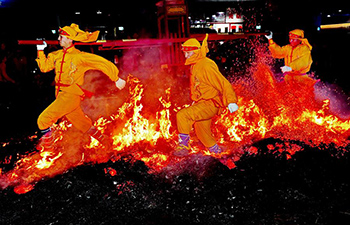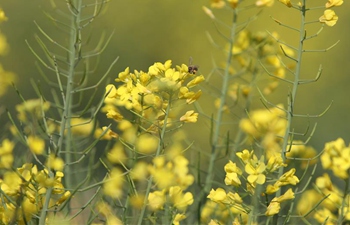CANBERRA, Feb. 22 (Xinhua) -- Sea rangers in Australia's Northern Territory (NT) are risking their lives to learn more about dugongs in shark and crocodile-infested waters.
The Department of Environment and Natural Resources (DENR) has teamed up with NT Parks and indigenous Li-Anthawirriyarra Sea Rangers to fit dugongs in the Gulf of Carpentaria, a shallow sea enclosed by the NT and Queensland, with GPS trackers.
The body of water is believed to be home to the highest concentration of dugongs in Australia but little is known about the population.
A helicopter is sent ahead to spot the medium-sized marine mammals while the on-water team chases dugongs until they tire, slinging a rope around their tail to hold them close while rangers take measurements and fit trackers.
A NT Parks ranger stands on the boat with a rifle, ready to shoot any crocodiles or sharks that pose a threat.
"Usually this time of the year we have a lot of jellyfish, and it's crocodile breeding season," Sea ranger Shaun Evans told the Australian Broadcasting Corporation (ABC) on Friday.
"I'm always nervous about crocodiles and sharks in the area, but we trust the other group that they keep a good eye on everything.
"From my point of view it's really important to see the dugong's movements, how they travel, how they feed, where they end up."
DENR scientist Rachel Groom said that the research, funded by Japanese oil and gas giant Inpex as part of the environmental offset agreement with the NT government for its Icthys gas project, would help scientists understand how the dugongs move through their habitat.
"Dugongs spend most of their time in about 2 meters of water, but we can only see them when they're half a meter below the surface," she said.
"So we're probably missing 50 percent of the NT's dugongs just by doing that survey.
"So what we will probably find, by collecting all this data, is that we actually have maybe twice as many dugongs or several factors higher than we currently have as an estimate."













